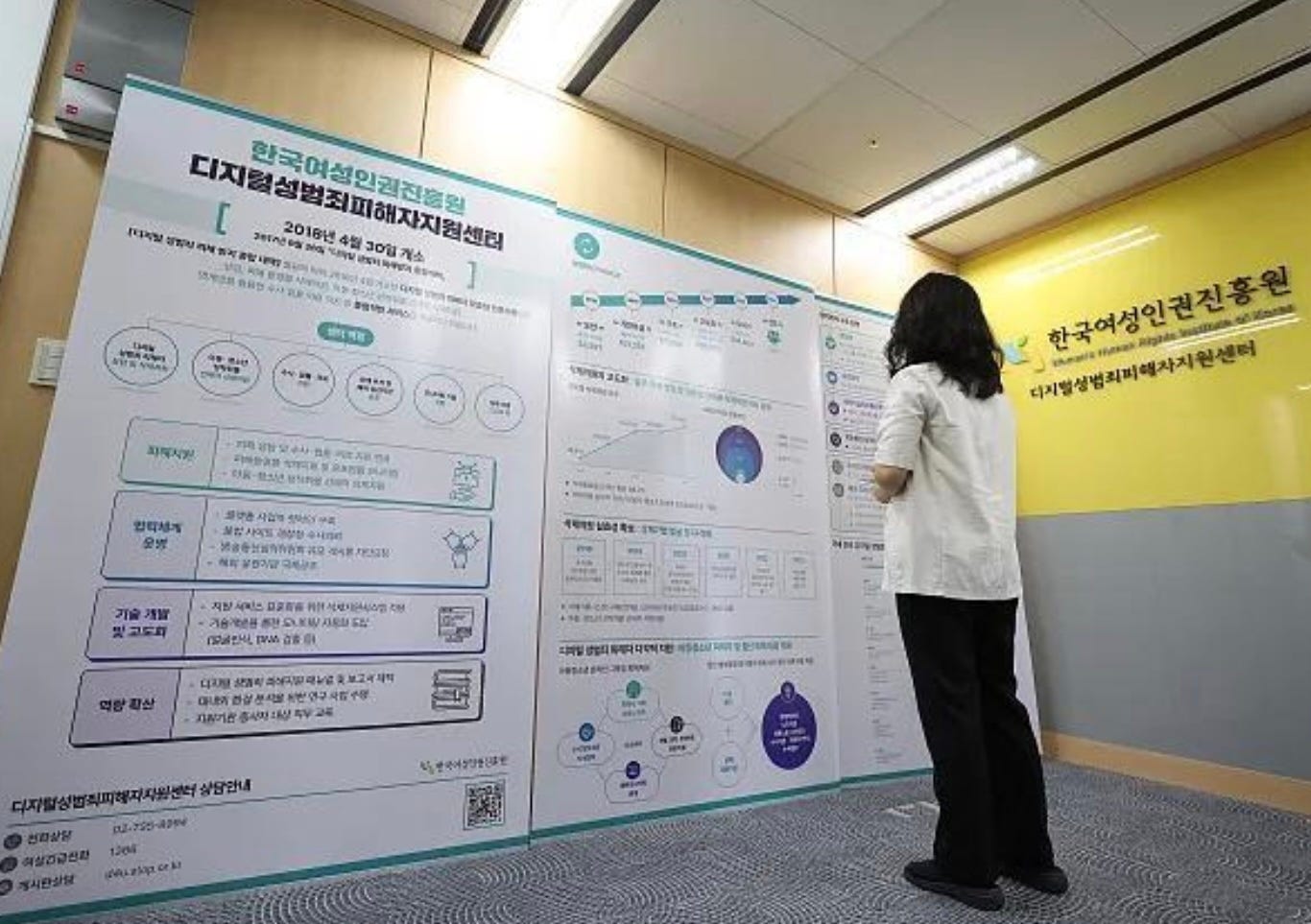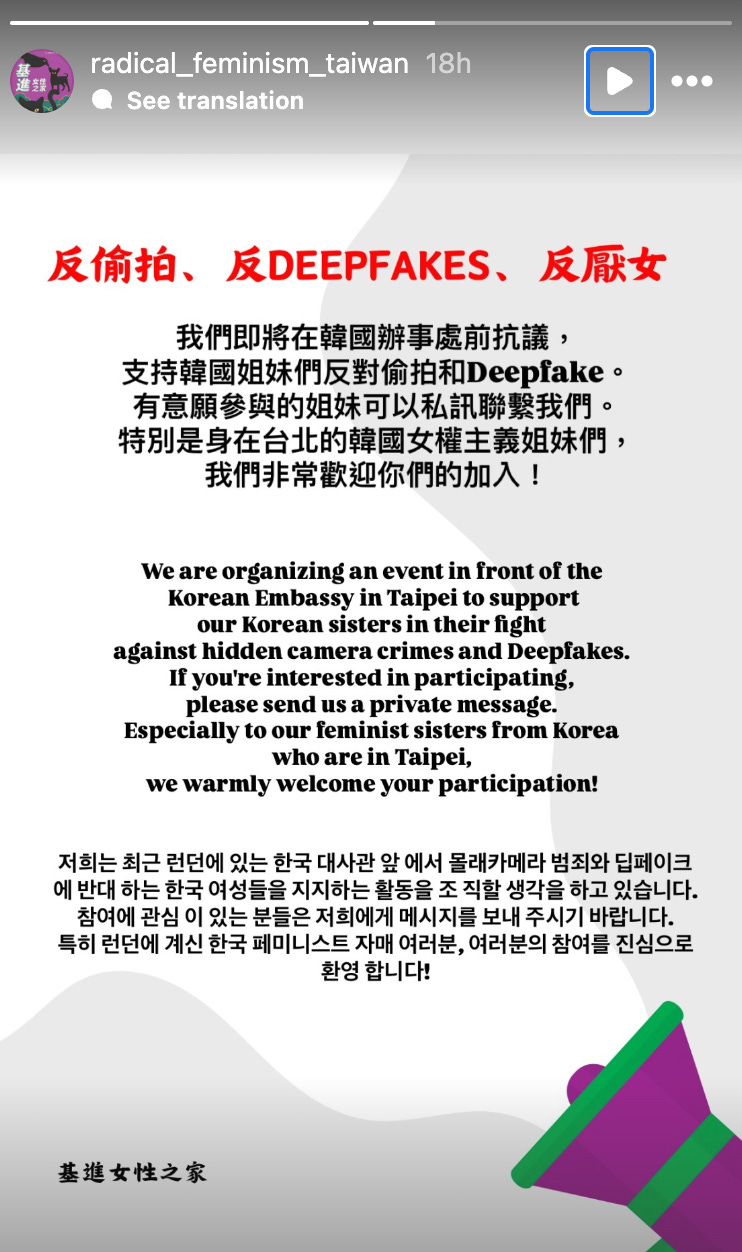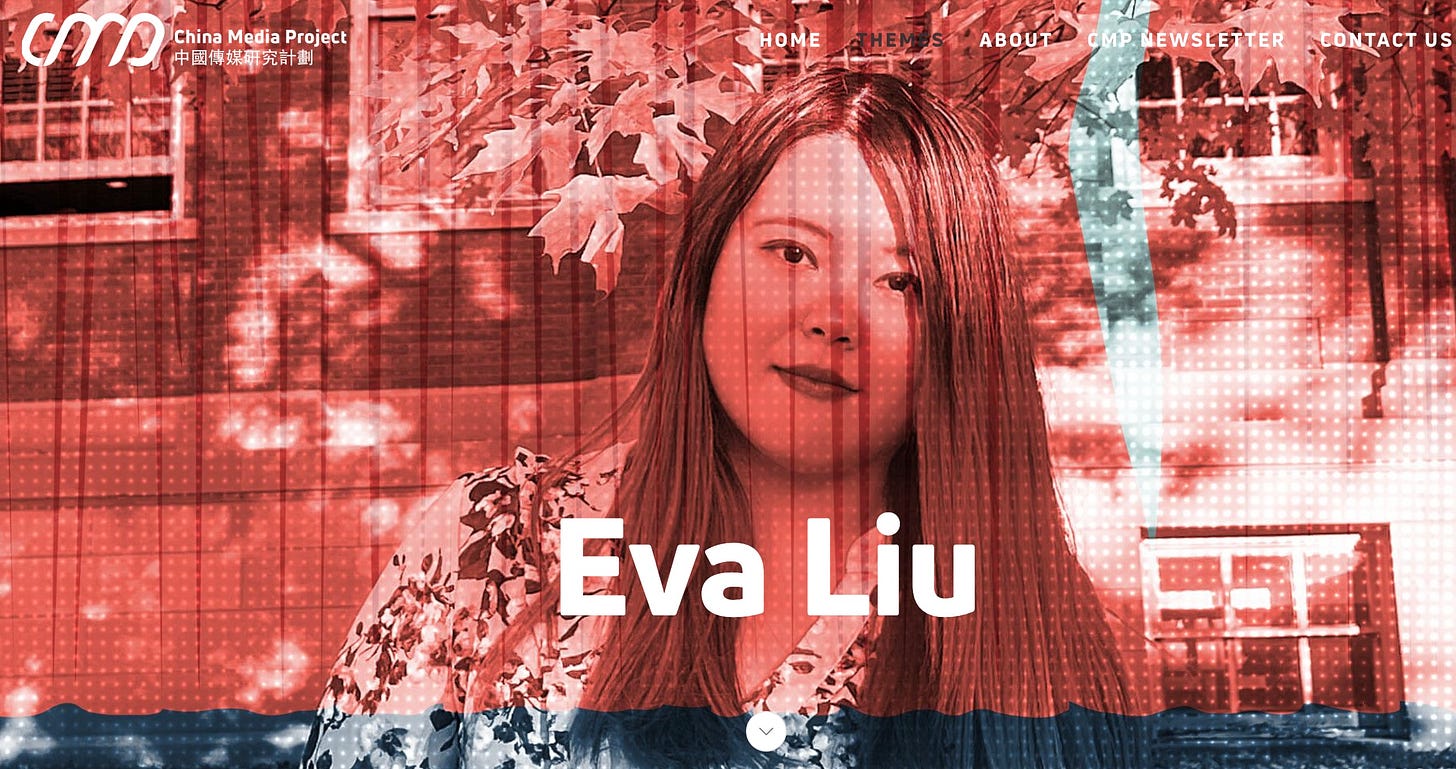INTERSECTIONS/ September 13, 2024
A rundown of issues, analysis, and must-read stories about women and female representation in the Sinophone landscape.
Dear subscribers,
I wish you a happy Friday the 13th. Superstition can’t stand in the way of the third edition of Intersections — our monthly Lingua Sinica bulletin dedicated to coverage of women’s issues and feminism in the Chinese-language media space.
This month I look at several stories that have captured global attention, including the scandal surrounding illicit Telegram chat rooms in South Korea, which has reverberated from Beijing and Taiwan. As usual, I also take a peek at how the Chinese Communist Party employs empowerment rhetoric in its top newspaper (ostensibly) for women in ways that enforce existing power structures — revealing a disconnect between stated goals and actual practices. Closer to home here in Taiwan, I look at the case of journalist Ma Yu-wen (馬郁雯), an infuriating reminder of how societal stereotypes continue to undermine the professional achievements of women.
As I said in my last bulletin, I hope these stories can prompt conversation and interaction. I welcome your suggestions about new outlets, stories, perspectives, or contributions — anything from films and books to short videos. Please reach out.
Bags of charcoal are on sale everywhere here in Taipei. I wish everyone a full belly of barbecued delights for the Mid-Autumn Festival (中秋節), whether that’s your standard beef or Taiwan pork (烤肉), or your vegetarian substitute of choice!
Dalia Parete
CMP Researcher
IN MOTION
“They Told Me It's Not Your Fault. And I Told Them Everything Will Be Fine."
As a soft voice in your headphones guides you forward, you glance up to an uneasy stage-set scene of a woman seated alone in a bar, perhaps waiting for someone. The thought flits into your head: “How many times have I been in this situation?” As the lights in the gallery dim, an unsettling sensation begins to creep into your chest . . . and you have to remind yourself that this is just an exhibition.

At Taipei’s Node94 gallery this month, local artist Ting-Ting Cheng (鄭亭亭) has transformed the complex issue of tech-driven gender-based violence into a powerful and unsettling experience. The exhibit offers an immersive and interactive environment, inviting visitors to delve deeply into this important subject, moving from experience to reflection.
Organized by the Friedrich Naumann Foundation for Freedom Global Innovation Hub, the exhibit is on from September 12-17 at Node94. For more information, check out the venue’s Facebook page.
OFFICIAL FRAMING
The CCP’s POV on women
Founded in 1984, China Women's News (中国妇女报) is the official newspaper of the All-China Women's Federation, China’s official women’s rights organization. The newspaper’s mission is to “sensitize society to women and women to society, advocate gender equality, and promote women's progress and development.” But the paper’s propaganda role often takes center stage. Each month I survey the paper’s front page to see what this mission looks like in practice.
First, my monthly rundown of front-page coverage:
ABOVE THE FOLD
Examining China Women’s News front pages for this month, it’s evident that Xi Jinping’s meetings with African counterparts take precedence over women’s issues — even in a paper ostensibly for and about women. Are we surprised? Not exactly.
If you read our most recent Lingua Sinica newsletter, you know that Africa was the biggest topic of coverage in the Party’s official People’s Daily (人民日报) last week. It looks like China Women’s News did the same. The paper’s front pages from September 5 to September 7 were all about Africa and the forum in Beijing with 53 visiting African countries. Extensive coverage of the event in state media clearly showed the CCP’s focus on Africa in its foreign policy.
As an official paper, China Women’s News is of course obliged to follow the Party line at least to some extent. But given their mission, we should also expect spotlighting of issues directly affecting women. So what did we actually see?
Notably, the only relevant piece this month appears on the front page of the September 7 edition, showcasing a case where the Supreme People's Procuratorate (SPP), China's top agency for legal prosecutions, supported a woman seeking a protection order against domestic violence. While the coverage of this case somewhat demonstrates the judiciary's commitment to strengthening women’s rights, it is also important to have a more consistent coverage of such societal issues in China’s domestic media, raising broader social awareness. While there has been some coverage of the story in other Chinese media, including theBeijing News and China Youth Daily, most have relied solely on the official SPP news release. The low level of attention to the story in China Women’s News suggests the paper is not living up to its stated mission.
PRIORITY GAPS
Married Out
Xi Jinping recently sent a congratulatory letter to the Shanghai Cooperation Organization Women’s Forum in Qingdao, celebrating women’s achievements and their role in his "community of shared destiny" concept. This gesture, highlighted in the People’s Daily yesterday, reflects China's use of empowerment rhetoric while often maintaining existing power structures.
In his letter, reflecting the Chinese Communist Party’s recent focus on “high-quality development,” Xi leaned again on technological and digital advancements — as though these alone could be used to spur “women’s development” (妇女事业发展). The reality, however, is that women face social, cultural, and institutional limitations — including, as statistics have shown, significant discrimination in the workplace — that are not at all technological in nature. For example, "married-out women" (外嫁女) face significant rights deprivations, particularly related to land and village membership, an issue New York Times reporter Vivian Wang explored in a report over the weekend.

In fact, several media outlets in China have quietly pushed in recent years to draw attention to how village women have been systematically denied benefits. Despite these reports, discrimination has persisted, and cases of women seeking restitution have grown — showing the urgent need for better legal enforcement. Meanwhile, central state media, like the People’s Daily, have continued their parade of positive coverage, sharpening the tension between official narratives and the real experiences of women on the ground.
If you want to learn more, read my latest article on the CMP website.
MAKING WAVES
Tackling Digital Sexual Violence
The exposure late last month of illicit Telegram chat rooms populated with pornographic content, largely produced through AI deepfake technology, ignited vigorous debates in South Korea and Taiwan about the necessity for legal reform and societal transformation. Initium Media (端傳媒), a Singapore-based Chinese-language outlet, explores the implications of this crisis, highlighting both immediate and systemic issues surrounding deepfake pornography.
The Initium report not only clarifies the unfolding situation in South Korea but also sheds light on the escalating problem of digital sexual violence in Taiwan. Journalist Luo Song Chi (洛松齊) references a comparable incident from 2021 involving a Taiwanese YouTuber known as Xiao Yu (小玉), who was implicated in the creation and distribution of deepfake sexual images featuring prominent female figures.
This article presses the urgent need for enhanced protection against such exploitation, quoting from the joint statement released on August 29 by Korea Women’s Association United (KWAU) and 84 women’s groups, which read: "Digital sexual violence perpetrators rely on the tolerance and neglect of state institutions and have grown large and organized. The root cause is structural sexism, and the solution is gender equality."
For those in Taipei who wish to voice their support for this issue, a march is planned for Friday. September 20, starting at 7 PM outside the Korean Mission in Taipei. For more information, visit the Radical Feminism Taiwan Instagram page.
REGIONAL ECHOES
“I want to spread this story widely.”
The Telegram story in South Korea has also reverberated inside China this month — though there has not been corresponding discussion about the need for legal reforms and societal transformations to deal with digital sexual violence.
Shanghai’s The Paper (澎湃新闻) approached the story from the perspective of a South Korean woman identified as “Enmin” (恩敏), who in the wake of the revelations took to social media platforms in China, including Weibo and and Xiaohongshu, to raise awareness — including among Chinese women who might be living or traveling in South Korea. “I want to spread the news to other regions outside of Korea through English, Japanese and Chinese, which is why posted on Xiaohongshu,” she wrote. “I want to spread this story widely.”

For the most part, official state media in China focused on the immense scale of the South Korean scandal, noting as many regional outlets did that the Telegram channel distributing sexually explicit deepfake images had more than 220,000 users, and that more than 80 percent of the victims were women. A post by China Women’s News, cobbled together from foreign news reports, critically evaluated South Korea's legal system and the challenges facing enforcement challenges, including anonymity of users.
Reading through coverage in several outlets, I could not find Chinese media discussing the safeguards against the potential of such practices in China.
HERSTORY
Breaking Stereotypes
When a woman excels in her field, it’s often assumed she must have received help. This was the case for Ma Yu-wen (馬郁雯), a journalist at Taiwan’s SET News (三立新聞), a 24-hour news channel generally regarded as pan-green (leaning toward the ruling Democratic Progressive Party). After her exclusive report on financial misconduct allegations against Ko Wen-je, chairman of the Taiwan People's Party, aired on September 9, Ma Yu-wen faced derogatory remarks from former KMT legislator Tsai Cheng-yuan (蔡正元), who implied she used sexual favors to gain information.
Tsai's comments reflect a wider societal issue where women's professional achievements are frequently undermined by sexualized assumptions and accusations. This rhetoric not only discredits Ma's work but also reinforces harmful stereotypes that suggest women must use their sexuality to succeed.
On a brighter note, many in Taiwan, including Ma Yu-wen’s colleagues in journalism, are rallying to her defense. In a press release, the Association of Taiwan Journalists (台灣新聞記者協會) commented saying: “Casually insulting a journalist [..] with derogatory language [..] is not only inappropriate but also undermines the principles of gender equality.” Online, Threads users are particularly supportive of Ma, with comments such as “You’re highly professional. You’re beautiful. They’re jealous of you.”
AT THE GRASSROOTS
Charitable Challenges
Tencent's annual "99 Giving Day" (99公益日) charity campaign has become a September tradition in China, with the tech giant matching public donations made through its online platform. Since its inception in 2015, the event has grown into one of the country's most prominent philanthropic initiatives. But for some organizations, the bonanza can be a disappointment.
In a recent article on the campaign, Fanshan (翻山), an online channel for promoting gender equality in China, sheds light on the challenges smaller organizations face during “99 Giving Day” — especially when they focus on women. Generally, smaller charities struggle to connect with potential donors due to a lack of visibility, leading to limited resources and ineffective community engagement, as the fundraising structure favors larger organizations. Administrative hurdles, such as lengthy processes to access funds, can also delay benefits.
While funding does exist for women’s issues, Fanshan writes, the framing of these issues often restricts support for critical initiatives such as sexual harassment prevention and mental health support for rural women. For those interested in donating to smaller charities that do more direct work with women in China, Fanshan offers its own list here — though I hasten to add that I have not vetted this list.
THE EXPERT VOICE
What do you know about “pink feminism”?
China's emerging feminist movement has suffered due to the government's crackdown on independent civil society and perceived threats to Communist Party rule over the past decade. With increasing state control and restrictive laws affecting domestic NGOs, digital platforms have become crucial for feminist expression. This environment has led to the rise of "pink feminism," a blend of feminist discourse and the nationalism promoted by China's online nationalists, known as "little pinks" (小粉紅).
I sat down with Eva Liu to explore together whether this fusion represents a genuine ideological blend or is a strategy for feminists to express their views without government backlash.
To find out more, read the full interview here!











